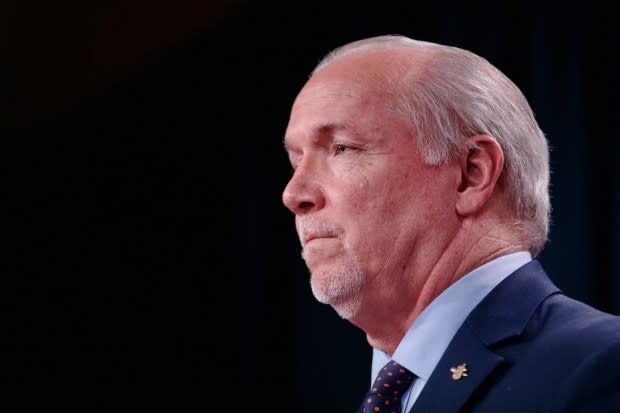Travellers returning to B.C. from abroad will be stopped if they don't have self-isolation plan: province
Every traveller returning to B.C. from abroad will now be required to present a formal self-isolation plan to provincial and federal authorities before they are allowed into the province, officials announced Wednesday.
Premier John Horgan said the new legal requirement is effective immediately at land borders, as well as Vancouver International Airport.
"This is not a suggestion — we have an expectation of those that have been away," Horgan said Wednesday.
The province said travellers' plans must show, in detail, that they have supports in place to safely self-isolate for 14 days. The plans will have to be approved by authorities before passengers can move forward.

Horgan said people who do not have a plan will be sent to a "quarantine site" until they make one.
"If you don't have it figured out, you'll stay there for 14 days," Horgan said Wednesday.
Officials in B.C. have been concerned errant incoming passengers could undermine weeks of physical distancing efforts at home by disobeying self-isolation rules.
Snowbirds and thousands of Canadians are set to arrive home on repatriation flights over the next several days. There is a strict, mandatory isolation order in place under the Quarantine Act for travellers returning to Canada: They must go straight home and stay there for 14 days. No grocery shopping, no visits with families, no quick local trips.
Ignoring the order could result in fines of up to $1 million or three years in prison.
'I wish we had done it a week ago'
The Canada Border Services Agency has been one of the first lines of defence to educate travellers, screening arrivals for symptoms of COVID-19 and issuing direction to all of them depending on their health status.
In order to pass customs, passengers have also been required to acknowledge the need to self-isolate. Horgan said that will continue and people with COVID-19 symptoms will not be allowed to leave.
Dozens of Canadians have already returned from abroad. Speaking earlier Wednesday, Horgan said he wished B.C. had implemented the plan requirement sooner.
"I wish we had done it a week ago, but we can always say in hindsight that we could've done better. And, as I say, we are writing this as we go."
Forms for the self-isolation plan can be submitted online or completed in-person on arrival.
The Vancouver airport is one of only four Canadian airports designated to accept international flights during the pandemic. The Canada-U.S. border has been closed to non-essential travel since March 21.
100% compliance with distancing still critical
Physical distancing has, so far, appeared to have helped claw down B.C.'s infection curve. Health officials and Horgan agree that early action, widespread compliance and a bit of luck have helped the province where other jurisdictions such as Ontario and Quebec have struggled.
Still, officials across the board have said B.C. is far from out of the woods and "100 per cent" compliance is still critical. They have urged the public to persevere, especially ahead of the upcoming long weekend with warm, dry weather in the forecast.
"We're concerned that British Columbians will take too much heart from the positive indications we've seen and they will lighten up on their activities to isolate. We need to focus on that," said the premier.
Horgan said enforcement for incoming international travellers is a "work in progress," but he said citizens who see neighbours acting poorly after they've been abroad should encourage them to get back inside from a safe distance. If the situation continues, the premier said witnesses can phone public health or local law enforcement.
"We're going to be making more significant announcements over the next couple days to encourage people to stay home, to encourage people to stay the course," he continued.
"The only way we're going to get back to a sense of normalcy is if we continue to follow the guidelines put in place by [provincial health officer] Dr. Bonnie Henry, even on the sunny days in British Columbia."
If you have a COVID-19-related story we should pursue that affects British Columbians, please email us at impact@cbc.ca.

